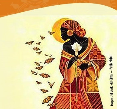Banca de DEFESA: NIKATIA BELAU DA SILVA
Uma banca de DEFESA de MESTRADO foi cadastrada pelo programa.DISCENTE : NIKATIA BELAU DA SILVA
DATA : 27/04/2021
HORA: 15:00
LOCAL: CPF-SEDE
TÍTULO:
THE ABIÃ AND THE TERREIRO: NARRATIVES ABOUT THE EDUCATIONAL AND IDENTITARIAN PROCESS IN THE TERREIRO ARAMEFÁ ODÉ ILÊ
PALAVRAS-CHAVES:
Abiã. Terreiro Amefá Odé Ilê. Candomblé. Educational process. Indentities.
PÁGINAS: 140
GRANDE ÁREA: Ciências Humanas
ÁREA: Sociologia
RESUMO:
The candomblé manifests itself as result of the (re) construction of an Africa in diaspora, a way of reframing the traditions, cultural values and religious values. The cosmogony of the candoblecist ritual being consecrates itself as a well discussed theme in the academic environment. Among so many approaches, there’s a special focus on what concerns the hierarchy existing in the terreiros and the stages reached by the adepts through the passage rituals, from which three figures are found: the abiã, the iaô and the ebôme. However, among them, the abiã has been target of few studies. As first category of the candomblecist hierarchic chain, the abiã is the one who goes to the house to understand the liturgy, to learn the sacred practices and, mainly, to exercise the education of attentive listening. In the terreiro of candomblé, speaking is tradition and listening obligation. It shouldn’t be forgotten that abiã is beginning, the one who learns inside the terreiro to be born in axé, for that reason, they are always accompanied by those who teach, the oldest in Ilê. Thus, conceiving the educational process as an alive tradition, whose manifestation comes in various ways, this work aims to comprehend how the abiã of the Terreiro Amefá Odé Ilê, terreiro of candomblé of the nation Ketu, situated in the city of Teixeira de Freitas/BA, perceives the educational process in which they are enveloped during the religious practices and how these elements surround the formation of an candomblé member’s identity. Specifically, observing the learning process of the abiãs in the terreiro Aramefá Odé Ilê; identifying practices and knowledges transmitted in the educational process of the abiã in the terreiro Aramefá Odé Ilê; describing the perception of the abiãs about the educational process in their religious community; reflecting on the teaching-learning of the Amefá Odé Ilê and investigating the meaning of candomblé to the abiãs on the construction of the identities, cosmovisions of world and society. It is understood that the process of identity construction of the person in the terreiro is intimately linked to the educational course inside the religion, edified on the knowledges of the oldest, responsible for the transmission of religious knowledge. As theoretical contribution, the following authors are highlighted: Bastide (1961), Carneiro (2008), Luz (2013), Prandi (1991), Castillo (2015), Ziegler (1972), Hall (2006), Freire (1978), Machado (2013), Hampâté- Bâ (2010), Braga (2019). In what concerns the methodological procedure, based on Meihy (2005), the oral history will be used upon the gathering of narratives of the abiãs, with the pretension of comprehending the perks of the learning process in the abianato of Aramefá Odé Ilê. For the operationalization of the collection means, oral narratives samples of a total of six abiãs will be reserved, and, for a larger diversity of perception, groupings of age, gender, class, education levels or any other variants were not made. The didactical product to be developed through this research project will be a video-documentary, with the title: “O Abiã e Terreiro: narratives about the educational and identity process in the Aramefá Odé Ilê terreiro”.
MEMBROS DA BANCA:
Externa à Instituição - ANA CELIA DA SILVA - UNEB
Interna - 3067096 - FABIANA CARNEIRO DA SILVA
Presidente - 554.349.325-87 - GEAN PAULO GONÇALVES SANTANA - UNEB



